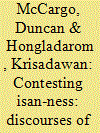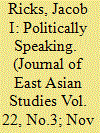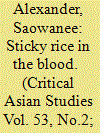| Srl | Item |
| 1 |
ID:
052462


|
|
|
|
|
| Publication |
June 2004.
|
| Summary/Abstract |
This paper discusses the idea of Isan (Northeastern Thai) ethnoregional identity, and its relationship with two major alternative ideas: Thai identity and Lao identity. Drawing on ethnolinguistic research, the paper argues that Isan identity is a problematic political construct, reflecting ambiguous self-understandings and self-representations on the part of Northeasterners. Northeasterners are engaged in a negotiation process about their relationships with Thai and Lao identities, relationships fraught with cultural, social and political ramifications. The study suggests a more nuanced appreciation of the ambiguities of Isan identity than has yet been proposed.
|
|
|
|
|
|
|
|
|
|
|
|
|
|
|
|
| 2 |
ID:
189047


|
|
|
|
|
| Summary/Abstract |
Language is one of the quintessential markers of ethnicity. It allows co-ethnics to easily identify one another and underscores in-group and out-group boundaries. Recognizing this, politicians frequently employ ethnic tongues to enhance their political appeal. To what extent does this shape the opinions of their audiences? Utilizing a survey experiment, I test the impact of an ethnic tongue against that of the common political language among the Javanese in Indonesia, the Tagalog in the Philippines, and the Isan people in Thailand. The experiment demonstrates that the ethnic language has a significant impact in both Thailand and Indonesia, but there appears to be little effect of using Tagalog over Filipino English in the Philippines. The findings suggest that ethnic tongues have the potential to significantly enhance political appeals, both among dominant (Javanese) and marginal (Isan) ethnic groups, but when the ethnic group is already the linguistic hegemon (Tagalog), such effects may be limited.
|
|
|
|
|
|
|
|
|
|
|
|
|
|
|
|
| 3 |
ID:
178401


|
|
|
|
|
| Summary/Abstract |
This article examines the extent, form, and motivations for Isan people’s involvement in the 2020 Thai youth protests, both in Thailand’s northeast region and in Bangkok. Based on observations of more than two dozen protests, news analysis, and interviews, this paper argues that Isan people’s participation in these protests was driven by a desire to exert political agency and address the political inequality of khon isan (Isan people), which has been omnipresent throughout the region’s long history of political struggles.
|
|
|
|
|
|
|
|
|
|
|
|
|
|
|
|